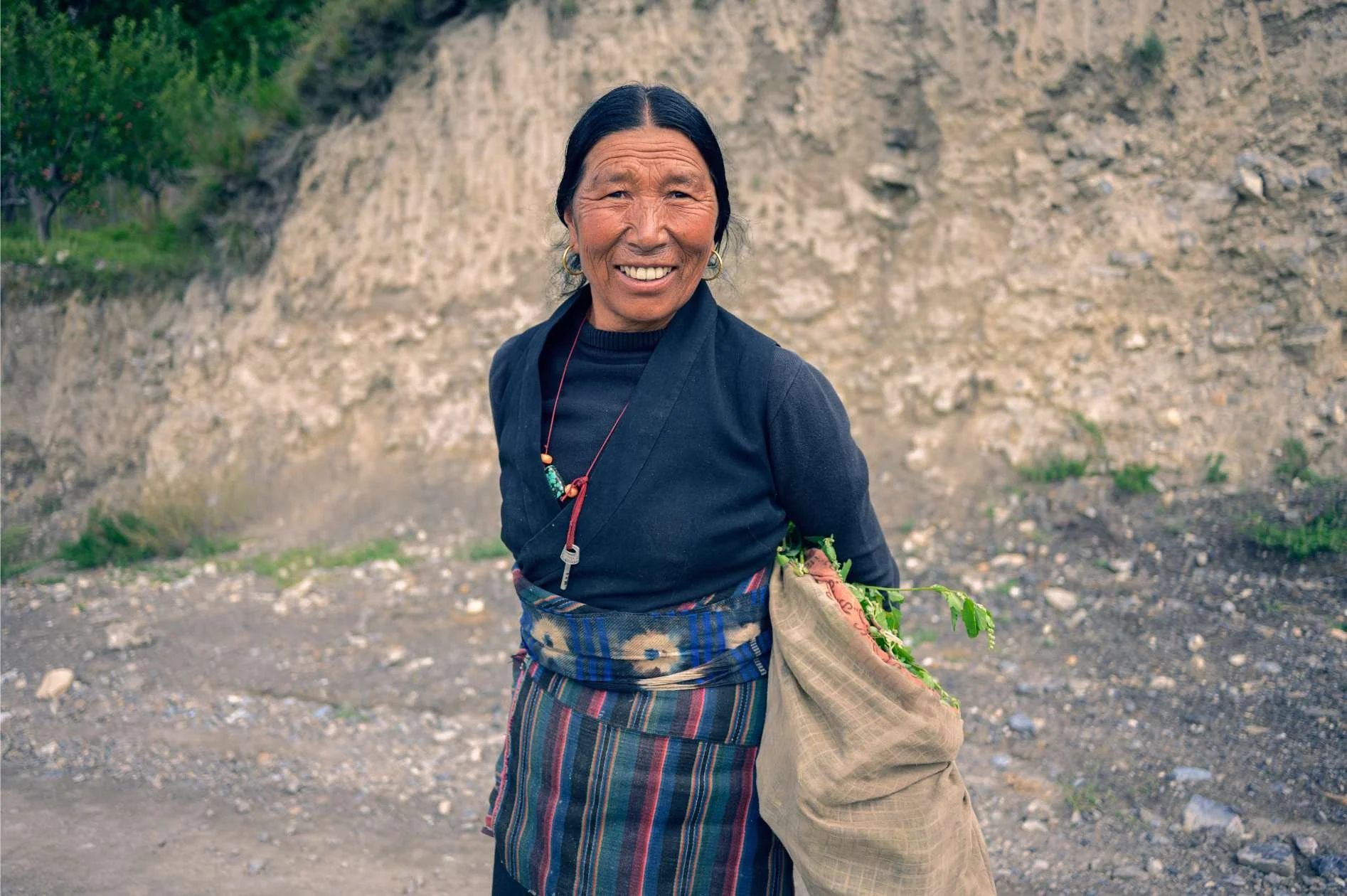A local’s guide to Mustang, Nepal
Written by: Deepa Somasunderam
Smriti Subedi / Traverart: An elderly man on the terrace of his house inside the once-forbidden walls of Lo Manthang
Inside the once-forbidden Mustang, an ancient kingdom that is sheltered by the tallest peaks of the Himalayas.
Welcome to our latest series, Live Local. We’re speaking to the trendiest locals to bring you travel information. We do this both to spotlight POC travel experts and help you access a true local experience.
Mustang has all the makings of the perfect mountainous retreat. It is located behind the Annapurna and Dhaulagiri mountain ranges and just inside Nepal’s border with Tibet. One of the most remote and least populated places in the Himalayas, its seclusion within the vastness of the mountains has helped the preservation of its people, culture and traditions.
Lately, Mustang has been in the luxe travel news because the Bensley Collection are opening a luxury mountain retreat, the Shinta Mani Mustang, in March/April 2023 and Mustang has been rated one of the top places to visit in 2023.
Mustang has two parts: Upper Mustang and Lower Mustang. Upper Mustang is isolated, distant and also known as the ancient Kingdom of Lo. It receives little rainfall so its full of deserts, rocky cliffs and is known for its ancient caves, villages, monasteries and palaces. Lower Mustang is more populated, at a lower elevation and has lush forests, fertile valleys and also has the famous Muktinath, a religious site for Hindus and Buddhists.
We wanted to take you to Mustang in the safe hands of a local so we spoke to Smriti Subedi, a Nepali traveller who recently filmed an immersive-experience travel documentary in Mustang. Keep scrolling for her tips.
MEET THE TRAVEL EXPERT
Smriti Subedi is the co-founder of Traverart, a media company, and Youtube channel dedicated to creating immersive travel experiences.
Smriti is from Kathmandu and is an adventurous full-time traveler with a passion for exploring new cultures, mountains, oceans and lesser-traveled destinations. Her mission is to inspire people to travel and explore the world as she believes that is where true knowledge and wisdom lies, while also promoting sustainable tourism and responsible travel.
Getting from Kathmandu to Mustang
The easiest way to get to Mustang is to fly from Kathmandu to Jomsom. However, Mustang is located between the ridges, so flights are pretty unpredictable due to weather conditions.
The second best option is to fly or drive to Pokhara and hire a jeep to lower Mustang. Since Mustang is fully accessible by road you will get to witness green lower mustang, apple farms, and the dry rain shadow region of Upper Mustang all the way to the Korala border with China.
Why you need to go to Mustang
Mustang offers surreal views of unrivaled landscapes you can’t find anywhere else along with well-preserved Tibetan culture that is hard to find even in present-day Tibet.
The mineral-rich mountains surrounding the oases like the villages of Mustang make you feel like you might as well have been on Mars. Home to over 10,000 cave complexes where people lived as far back as 2,000 years, it is also a haven for archaeology enthusiasts.
What you need to see in Mustang
Gumbas (Monastries) and caves are some of the must-visit places in Mustang. If I had to pick a few, they would be:
Charang Gumba
Luri Gumba
all the Gumbas in Lo Manthang are some of my favorites.
But there are also countless chortens (small stupas) throughout Mustang. One should definitely walk on the clean stone-cobbled streets of Marpha, visit the apple farms, and try some apples or apple brandies. These high-altitude apples are a must-try and are incomparable to any other apples you might have tried in your lifetime.
Smriti Subedi / Traverart
Off-the-beaten-track recommendations
The village of Yara Ghara which can be accessed from Lo Manthang by crossing a pass is the most surreal of villages.
It makes you feel like you are traveling back in time, or as if you are in a movie set. Visiting the area during harvest season makes it even more special.
Where you need to eat
Yacdonalds in Kagbeni and Royal Mustang Resort in Lo-Manthang are some of the best places to eat in the region. However, trying out local dishes at any of the restaurants or even local households is highly recommended.
Try some of the local dishes such as khapse, buckwheat dhido, lentils, potatoes, and home-brewed alcohol while you are there.
Affordable places to stay
Most of the accommodations in the region are tea houses and guest houses which are relatively cheap and affordable.
Luxury/upscale accommodation
Royal Mustang Resort in Lo Manthang offers some of the best accommodations and food throughout the Himalayas of Nepal.
The beauty products you need to take
Make sure to carry vaseline, sunscreen, and a lip balm to protect yourself from extreme sun and wind in the high-altitude regions.
What you need to wear and your travel accessories
Wear comfortable dry-fit clothes, a neck cover to protect from both sun and wind, sunglasses, and hats.
Smriti Subedi / Traverart: Woman returning from the field in Jhong village, Mustang
Make sure to carry a reusable water bottle to avoid using plastic bottles.
Also, try out traditional attires if you get a chance. The ones worn by local women are especially vibrant and beautiful.
Local customs, traditions and other trips
People in the Mustang region are very friendly.
However, avoid giving out money if anyone comes asking for it. Rather buy products/services from the locals.
Be respectful of the rules at the monasteries.
Stay open-minded and learn more about the people, their culture, and religion.







